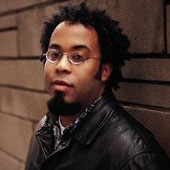Poet Kevin Young's Q&A and poet Natasha Tretheway's Podcast

This afternoon I heard poet Kevin Young (pictured left) read one poem, "Commencement," in honor of the same. See the MARTA post below for an explanation of my lateness. But I did get to hear him respond to some interesting questions on the writing process during the Q&A. Young is Atticus Haygood Professor of Poetry and Creative Writing at the Creative Writing program at Emory University where he is also Curator of the Raymond Danowski Poetry Library. He's got a
(Photo: Tod Martens)
seriously impressive publication record having edited three anthologies, with four of his own collections out and two more in progress (see his short bio here). He is probably best known for his blues poetry, Jelly Roll: A Blues (2003), and a collection on artist Jean-Michel Basquiat, To Repel Ghosts: Five Sides in B Minor (2002). Young answered a question about "writer's block" saying that he prefers not to use that term, and sharing his perspective that those less productive periods are times of germination and information gathering. He commented that when his father died he did have difficulty writing poetry, but he continued writing, "survival writing," to use his words. Then he was writing on another subject, food, and he was able to access what he wanted/needed to say about loss, writing nine poems in one sitting. What I gained from this is that arguably, no writing is wasted. Having a regular discipline, no matter how painful, keeps you in good stead during the less painful times when work may come pouring out. Someone asked how he had achieved his style, and Young made a great point which made the distinction between "style" and "tone". He talked about how many young writers are concerned with "voice" which is another word, in his opinion, for "style". These writers are seeking a voice/style that will get them noticed and published. Young posited that writing styles change over time (witness his own oeuvre to date), what you're really getting at as a writer is "tone". Here he used the analogy of Miles Davis' tone; while Davis changed styles--fusion, hard bop, pop minimalism, (regular) be bop--when you hear his tone you can always recognize it as being Miles Davis. I'm still not sure how one achieves that in writing, but what I took from Young's response was the need not to get trapped in a style, or its success (if you're fortunate enough to get that response), don't be afraid to go where the material takes you. That journey is where tone comes from anyway, which is part of what Daphne Brooks was asserting in her discussion of Jeff Buckley's Grace (see here for my take on that). So even though I missed most of his reading I was happy I went. Plus with all the waiting for transportation I'm almost done with Dubliners!
Poet Natasha Trethewey

I missed the opportunity to hear Gulf Port, Mississippi native Natasha Trethewey read last month. Tretheway is an Associate Professor, also in the Creative Writing program at Emory University, and a Cave Canem alum. She and Young have been up for some of the same awards in their field (both are Guggenheim Fellows) and both have southern roots, with Young being from the neighboring Louisiana. I am most familiar with Trethewey's second collection, the exquisite and mournfully visceral, Bellocq's Ophelia (2002), a series of poems based on photographer E.J. Bellocq's photographs of prostitutes in the legal brothels of New Orleans' Storyville district during the early 1900s. Trethewey's narrative poetry focuses on the interior life of one prostitute, Ophelia, for whom the silent capture on glass negatives is a partial life metaphor. Fortunately, I had the opportunity to hear Trethewey read from her new work, Native Guard, on PBS's The NewsHour Poetry Series as she visited the area for the first time in a year and witnessed the scarred remain of many of the locations referenced in Native Guard's poems. The poems capture the Gulfport, Mississippi of her youth and the lives of the members of the Louisiana Native Guard, a black Union Army regiment from the Civil War who were stationed on Ship Island near Gulfport. It was quite moving to see Trethewey reading her work, in some of these areas (her award-winning first collection, Domestic Work, details her mother's life, the Mississippi of Trethewey's youth, and the poet's own multiracial heritage). She originally imagined these poems as a figurative elegy of her memories, they now they operate literally as such for these places. If you want to hear Trethewey click the blue PBS link above, you'll need RealAudio to access the piece. The NewsHour also offers the series as individual podcasts, or you can subscribe to the entire series.

2 Comments:
nike factory outlet
ugg outlet
ugg boots
new england patriots jerseys
coach outlet
ugg boots
coach outlet store online
ralph lauren outlet
ray ban sunglasses
polo ralph lauren outlet
nike factory outlet
ugg outlet
ugg boots
new england patriots jerseys
coach outlet
ugg boots
coach outlet store online
ralph lauren outlet
ray ban sunglasses
polo ralph lauren outlet
zzzzz2018.5.17
air huarache
moncler online
coach outlet online
ralph lauren uk
ralph lauren outlet
pandora
christian louboutin outlet
nike tn pas cher
ugg boots uk
coach outlet
Post a Comment
<< Home